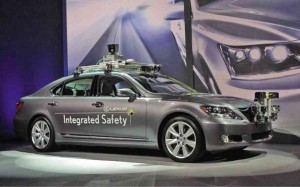Self-driving Toyota car aims to eliminate road accidents

LOOK MA NO HANDS! According to Toyota, the autonomous safety technologies installed in the Lexus LS are intended to create a virtual ‘copilot’ in vehicles to help drivers avoid accidents.
In the very near future, Toyota hopes to sell more types of its vehicles that gives drivers less of a role behind the wheel, especially during dangerous situations.
At a press conference during the Consumer Electronics Show (Las Vegas, United States) held in January, the world’s biggest car maker presented a sensor-laden Lexus LS sedan, that will serve as a test bed for reducing global traffic fatalities and injuries.
Toyota explained that the company’s aim is not to create a car that drives itself but one that enhances the skills of the driver, eliminate crashes and be more safe around people.
The tweaked Lexus LS scans movement of objects around it, identify a green light from a red light and measures the trajectory of the vehicle on the road.
It is equipped with GPS antennas on the roof to estimate angle and orientation even before the vehicle is in motion; a 360-degree Light Detection and Ranging device on the roof that detects objects around the car up to about 70 meters; three high definition color cameras that see other vehicles on the road and even read traffic lights ahead; radars on the front and sides that measure the location and speed of objects to create a comprehensive field of vision at intersections; an indicator at the rear wheel that measures travel distance and speed of the vehicle; an inertial measurements unit on the roof that read acceleration and angle changes.
In short, this modified Lexus LS is smart enough to essentially drive by itself—from starting up the engine from park, driving off, stopping to avoid collisions and safeguarding the occupants should crash occur.
Already, automakers have invested millions into systems that hand more control of a vehicle to a complex network of sensors and computers. These days, a number of vehicles feature collision avoidance systems that trigger the brakes or an alert if a potential collision is detected or if the vehicles wander into adjacent lanes.
Such systems could reduce accidents due to distracted or impaired drivers.
The Global status report on road safety 2013 indicates that worldwide the total number of road traffic deaths remains unacceptably high at 1.24 million per year—that’s 3,400 people die on the road every day.
Interestingly, according to the report furnished by the United Nations Road Safety Collaboration, only 28 countries, covering 7 percent of the world’s population, have comprehensive road safety laws on five key risk factors namely: drinking and driving, speeding, and failing to use motorcycle helmets, seat-belts, and child restraints.
Another company working on self-driving vehicles (and made headlines last year) is tech giant Google.
The Google team has about a dozen self-driving Priuses in operation—although these units have humans behind the wheel ready to take over at any time—and have driven a combined 500,000 kilometers in varied traffic conditions without any accidents while under computer control (a single accident occurred but was caused by human error).
Google said autonomous cars could be functional and safe for operation on public streets within a few years.














